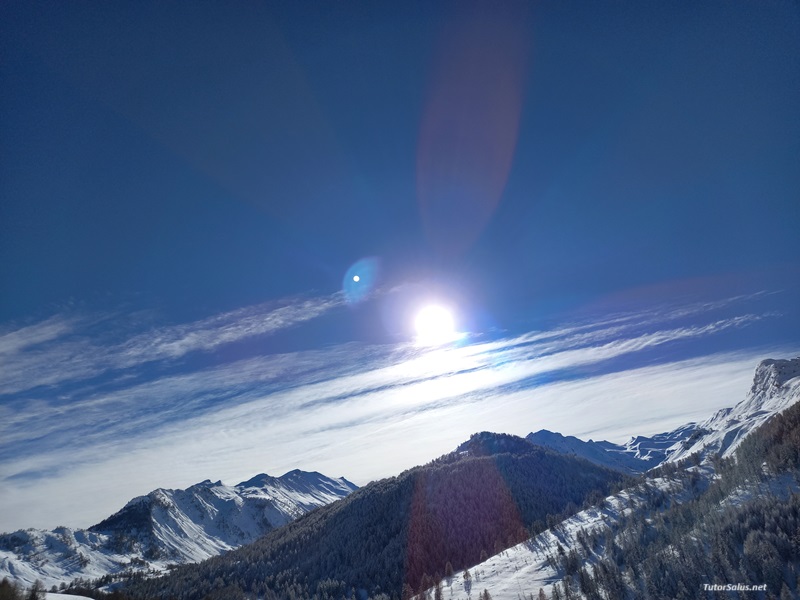An incredible winter.
‘Perlasca’[1], by and with Alessandro Albertin.

In the photo: the Alps near Barcelonnette (Provence, FR) on the border with Italy.
Endless winter is the sleep of removal, always by threat, of losing love, or freedom, or even one’s life : a thinking which first and foremost censors, as it is in the arrogance of every despotism, terrible without mitigating circumstances.
Alessandro Albertin is author of the work which, with trained fluency and a special ability to arouse curiosity, is bringing to the scene in recent months. The story is not his, it is Someone else’s who was able, as a matter of facts, to question him to this extent, Someone else who was, precariously balanced, in Budapest in the years 1944 – 1945, at the crossroads never erased that the proclamation of the Armistice of 1943 made a difference for Italy : on the one hand the euphoria for the end of the Second World War, on the other the beginning of a severe persecution and extreme civil war by a defeated and utterly enraged Nazism. In short, something that is not taken into sufficient account when faced to victory – and serious responsibility of all rulers in neglecting – and something cruel at the same time, as every coming back of removal really is in life.
Giorgio Perlasca has just come out of his own war experience, volunteer fighter in Spain[2], at Budapest he is talentedly starting a meat business : but an Armistice is an Armistice, enough with the enemies now ! And he finds himself wanted, just like everyone that Gestapo goes to track down one by one in their houses, elderly and children, women and men, Jews first and foremost but not only : the fury of those who are defeated has no equal. An endless winter, no more seasons. Perlasca has family in Italy, to save himself he retrieves a letter of introduction, written and signed by the general Francisco Franco with which he can ask the Spain Embassy for any help, even at Budapest : and it is here that, together with his own salvation, Jorge – no longer Giorgio – Perlasca finds himself facing the injustice of the Case for which many in Budapest are rounded up, killed or deported in the nearby concentration camp of Auschwitz. Jorge remains at the Embassy, and precisely with that safe conduct, whose power he skillfully manages to strengthen and expand, he recovers the lives of thousands of persecuted people - Spanish Jews first and foremost, but not only - thus disobeying the Law of Hungary. When he will come again in Italy, no one will hear anything from him, Perlasca will resume the life he interrupted and invent a job, getting by in that very difficult post-war period which however the short 1960s would even go so far as to forget.
Doesn’t feel like remembering ? Anyone interested in listening to him ? Recognize the privilege of merit in others ? Perhaps.
Knowing you have saved someone is the certainty of a partnership, so real that it does not seek extras – even if one gets it sometimes. So incredible is one’s psychic occurrence indeed, it doesn’t appear and has thousands and thousands of forms, and even in the winter of life.
Marina Bilotta Membretti / Cernusco sul Naviglio – February 10, 2024
[1] ‘Perlasca. Il coraggio di dire no’, by and with Alessandro Albertin, directed by Michela Ottolini, produced by ‘Teatro de Gli Incamminati’, Milan. Alessandro Albertin has been received last January 27 at the ‘Quirinale’ by the President of the Republic Sergio Mattarella, on the occasion of ‘Remembrance Day’ : here he read a piece from ‘Perlasca. Il coraggio di dire no’ and also introduced the testimony by Cesare Rimini, ‘Una carta in più’. Graduated from the ‘Scuola d’Arte Drammatica Paolo Grassi’ of Milan, Alessandro Albertin (Padua, Italy - 1972) already brought to the stage ‘Lo Sbarco in Normandia, i segreti di una vittoria’, ‘Marco Pantani, il campione fuori norma’, ‘Prometeo incatenato’ by Aeschilous for the ‘Greek Theatre’ of Siracusa (2023) : he worked with Virginio Gazzolo, Gianrico Tedeschi, Andrée Ruth Shammah, Gigi Proietti, Ugo Pagliai and others.
[2] Known as the ‘Spanish War’, was the long and terrible civil war which broke out following the military coup (July 17, 1936) that brought the general Francisco Franco to power in March 1939, and installed a fascist dictatorship which remained in government until around 1975.

